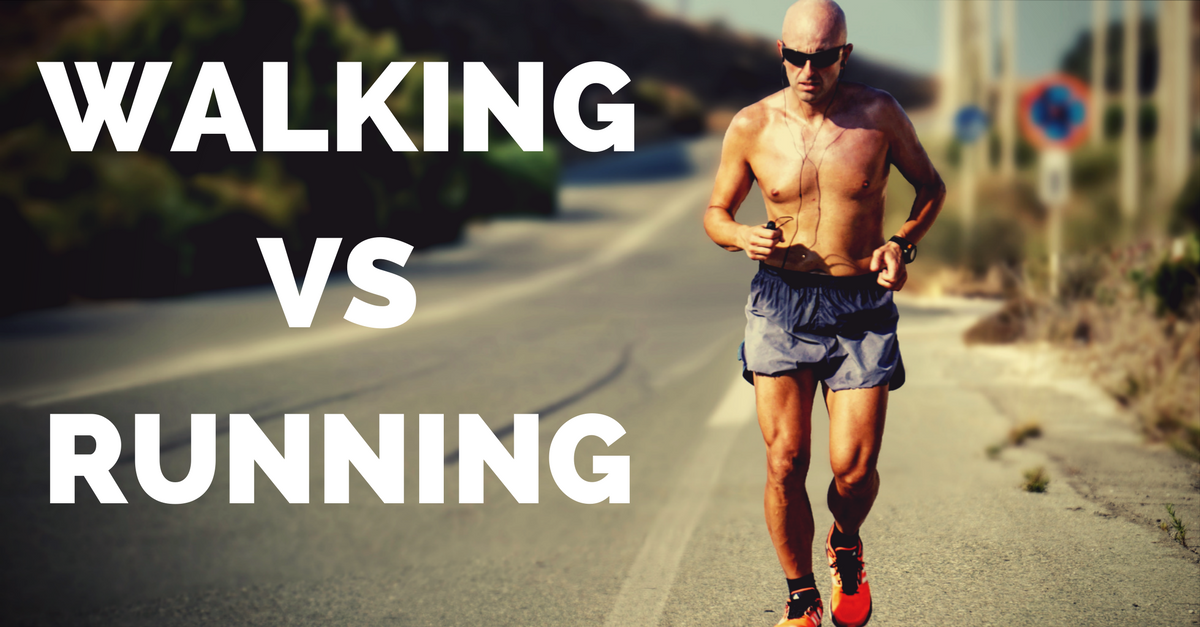
Have you ever seen someone walk so hard that they threw up? Me neither. If you stand at the finish line of a marathon, seeing people collapse or throw up isn’t entirely uncommon. It’s obvious that these runners went through a tough ordeal. Standing there you’ll also notice that most of them are anything but fat. And that’s not just because they throw up their banana at the end of the race. It’s because they burn a metric ton of calories. Imagine you could burn a collapse-and-throw-up amount of calories with something that doesn’t actually require collapse-and-throw-up amount of effort. How awesome would that be?
Walking and running don’t burn the same amount of calories. If you run for an hour, you’ll burn more calories than if you walk an hour. Even if you compare it by distance, running a mile versus walking a mile, it’ll turn out that running actually burns 25% more calories than walking. So far so obvious: An easy and obvious cases for runners, right? Except it’s not that simple.
Don’t Underestimate Walking
Try this: Where ever you are right now, stand up and start walking. Do it briskly. Don’t stop for the next 30 minutes. Done? Congratulations, you just burned an average of 129kcal.
If you do this twice a day – on your way to work, while picking up a pack of cigarettes or when going for a drink – you just burned 258kcal. That just increased your entire daily calorie expenditure by 12 to 15%. That’s a lot. In fact, it’s even more than that pint you just got at the pub to which you walked. It won’t make up for the cigarette, but it does compensate some of the calorie burn.
People tend to underestimate the calories burned while running. It’s not quite the same whether you walk or run a mile (we’ll get to that in a minute), but in terms of physics, you move your body weight across the same distance. The energy required for that is very similar (even though it takes a lot more time).
Calculate the Actual Calories per Minute Burned
Now let’s try that ‘go out and walk’ thing again, but this time, instead of walking briskly, run.
Specific numbers will depend on speed and weight, but let’s ignore that for now. You also didn’t really go for a walk or for a run, and just continued reading. And that’s the part I’d like to focus on: You didn’t go for a walk, because you were busy, might have been on a bus or had another reason why it would have been an interruption. That’s okay. Your reasons for not going on a run however, are much deeper: You didn’t go for a run, because you would have been drenched in sweat, wouldn’t have had a proper place to run or didn’t even have on your shoes.
If you had indeed gone for a run, you would have to put on shoes, drove to a suitable running track, do the run and then return and take a shower before you could have continued reading. That 30 minute run wouldn’t have been a 30 minute time commitment, but a 90 minute ordeal of getting dressed, driving, running, returning and showering. In spit of burning easily three times the calories during the actual run, the calories burned per minute when counting all necessary preparations and consequences would have been the same as the 30 minute walk.
When people compare running and walking in terms of calories burned, they often don’t take the additional time requirements of running into account. If you do, on terms of calories burned per time invested, walking and running would be on par in this example.
Sweet Negative Travel Time
Imagine your commute to work wouldn’t take up time, but would actually provide you with extra time. Negative travel time if you so will. It would turn your commute from something dreadful to something desirable.
When looking at the calories burned per minute, the argument goes even more in favor of walking: While running requires you to specifically go out of your way to the actual run, walking can actually be done while going in the same direction you were going anyway: Let’s say you have to go the pharmacy to pick up a pack of blister band-aids after your latest afternoon run. Between hunting down your car keys, stopping at a few red lights and finding a parking spot, you might spend 10 minutes making it to the pharmacy.
Let’s assume the same walk would take you about 20 minutes. Remember the calculation of time spent on walking versus calories burned? Guess what. Your 20 minute walk didn’t require you to commit an extra 20 minutes to physical activity. In fact it’s just an extra 10 minutes over your next best travel option. You just got 20 minutes of calories burned for the price of 10. Walking actually carries ‘negative travel time’: Instead of spending time getting somewhere to walk, you actually regain part of your time during your walk.
If walking and running had been on par before, adding that you actually get where you wanted to go in the first place while walking, would tilt the balance definitely in favor of walking.
Understand the Science
The New York Times reported on a study that compared the calorie uptake post workout for walkers and runners in a study. It showed that walkers actually ate more than they burned, whereas runners actually ate less than they burned post workout.
I’m a bit a skeptical of the results of the study due to my own anecdotal experience: As a runner, the real post-workout hunger doesn’t set in until the next day. I might not eat a lot right after a run – maybe also because I drink so much water that there isn’t much room for food – but I certainly make up for that the next day. I tend to see this when I log calories: On the day of a long run, I’m always way below the calorie target, but the next day it’s downright impossible to stay within calorie limits.
This said, I think it’s important to note that the current scientific stance on this seems to be that for weight loss, running is the better activity. The good news is that the same article goes on to say that many of the other health benefits apply equally much to runners as well as walkers.
What’s the Next Step?
Having established that running is better than walking when it comes to weight loss, why bother with walking at all? Because the two aren’t mutually exclusive. Sure, if walking to an appointment means you don’t have time to go for a run afterwards, then that seems to be a bad choice for weight loss.
For everything else though the question is really how much overlap there is? Because even if walking may not measure up to running when it comes to weight loss, it does have a positive effect and seems to provide a lot of the other benefits that running does.
Most anyone who has succeeded in weight loss had to witness at some point how the pounds snuck back on. Very few people actually manage to lose weight and keep it off. And in most of those cases, the lasting impact comes from lifestyle changes. Not something you start and repeat, but something you’ll do forever.
What’s a better strategy when it comes to ‘forever’? Walk places, or become ‘a runner’?

Interesting, and a bit surprising. I saw a similar study with cycling vs running which had me thinking cycling a better option (low impact). Though if you’re not in the countryside you’re probably stuck on a stationary to maintain any kind of speed. I’m surprised how well (speed-)walking holds up.
How has the .me changed things for the site if at all?
Found one of them: https://www.livestrong.com/article/372790-cycling-vs-running-calories/
I guess what always holds true is that doing something (and keep doing it) beats not doing it or just doing it temporarily. That makes whether it’s sustainable or not the primary question for me. I moved away a bit from too productivity focused work outs and instead look more at work outs I enjoy doing (e.g. lighter cardio where I can listen to podcasts while doing them). This way I actually look forward to work outs rather than ‘soldier through’ them.
Haven’t posted anything since switching to karsten.me. Just decided to take some action on the whole ‘no one can remember that name’ thing. Was a $300 one time purchase with normal annual renewal fees, so I figure given the time I invest in the site it’s a worthwhile branding change. No practical impact so far yet though.
Came across an article showcasing that walking boosts creativity (regardless where it’s done): https://news.stanford.edu/2014/04/24/walking-vs-sitting-042414/
(via https://www.walkingkata.com/blog/2017-01-10/the-value-of-walking)